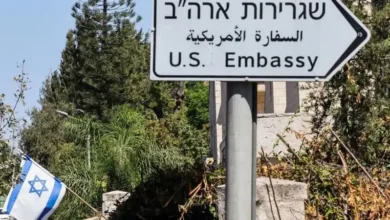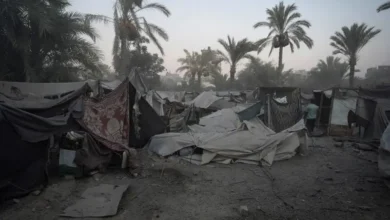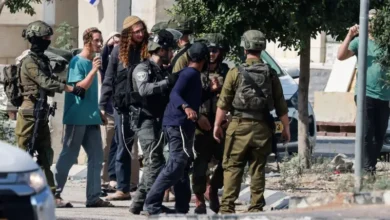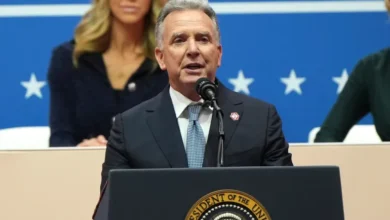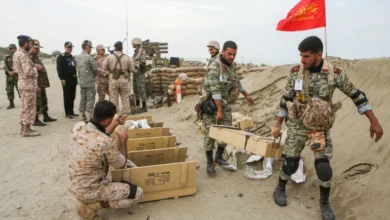Student protesters reach a deal with Northwestern University sparking criticism

For five days, Northwestern University’s Deering Meadow rang with the shouts of student protesters and supporters joining demonstrations against the Israel-Hamas war on college campuses nationwide.
But Tuesday morning the grassy meadow on Northwestern’s suburban Chicago campus was silent after student organizers and the school announced an agreement late Monday to curb protest activity — in return for a new advisory committee on university investments and other commitments.
On campus Tuesday, two unoccupied tents remained, surrounded by abandoned folding chairs, cases of bottled water and other supplies.
Some who are protesting the war in Gaza condemned the agreement as a failure to stick to the original demands of student organizers. Some supporters of Israel said the deal represented “cowardly” capitulation to protesters.
The harsh response and escalated protests elsewhere Tuesday suggest that the agreement at Northwestern is unlikely to spur similar deals, even if it quickly stalled protest activity in Evanston.
The agreement lets protests continue through June 1 but bars all tents except one for aid supplies. It also prevents people without ties to Northwestern from participating and requires school permission to use loudspeakers or similar devices, according to copies made public by the school and the student organizers.
Northwestern’s statement said it would enforce the deal, which includes possible penalties for students who did not comply, like suspension.
“This agreement represents a sustainable and de-escalated path forward, and enhances the safety of all members of the Northwestern community while providing space for free expression that complies with University rules and policies,” said a statement attributed to President Michael Schill, Provost Kathleen Hagerty and Vice President for Student Affairs Susan Davis.
The American Jewish Committee and the Anti-Defamation League Midwest were among critics of the Northwestern administrators, arguing that the deal “succumbed to the demands of a mob” and did little to make Jewish students on campus feel more secure.
Around the country, protest organizers at US universities say they’re building a peaceful movement aimed at defending Palestinian rights and protesting the war.
One of several groups that planned the anti-war protests at Northwestern was Jewish Voice for Peace.
In Instagram posts about the deal, protest organizers said the reestablishment of an advisory committee is a first step toward divestment — an original demand that the school stop investing in all companies profiting from the war.
University representatives did not immediately reply Tuesday to messages seeking more information on the advisory committee’s role or the history of a similar body at Northwestern. The agreement said it would include students, faculty and staff.
The protest organizers also noted Northwestern’s commitment to build a house for Muslim student activities and to fundraise for scholarships going to Palestinian undergraduates.
But the organizers seemed to anticipate disappointment, and said they view the deal as just a beginning and that they’ll continue to pressure administrators.
“We have seen incredible momentum grow in support of our movement in these past few days and will not let it go to waste,” a post on the NU Divestment Coalition’s Instagram read. “We consider this to be a prime moment to take stock, recharge, plan, and build power. But we have much work ahead of us and we will not stop now.”
Eden Melles, a graduate student among the Northwestern protest organizers, said Tuesday that reestablishing an advisory committee is “huge” but she also understands criticism of the agreement.
“We’re not letting up pressure on Northwestern because there are people on this campus who feel unsafe, have felt unsafe for years, and disclosure is not going to make them feel safe,” Melles said. “That’s not going to fix the problems that this university has cultivated.”
She said organizers on each campus have to make their own decisions when negotiating with administrators, not follow an exact model created by another school.
Brown University on Tuesday became the second school to announce a deal aiming to end student protests.
Administrators and student organizers of the protest on the campus in Providence, Rhode Island said President Christina Paxson had committed to an October vote by the school’s governing board on the students’ divestment proposal. Protest organizers said they would end demonstrations by late Tuesday.
The pro-Palestinian tent encampments began sweeping across the country after a crackdown on a Columbia University when police arrested more than 100 protesters on April 18. On Tuesday night, Columbia called police back again to clear protesters who had occupied a campus building.
University administrations across the country have used a variety of strategies in response to protests. In some places, police have arrested dozens of people while elsewhere campus leaders have sought to negotiate over protest strategies while allowing them to continue.
In Baltimore, leaders of Johns Hopkins University announced Tuesday morning that they had reached an agreement with student protesters who had started setting up an encampment Monday evening. After several hours of discussion, they said, the students agreed to clear the encampment and resume protesting only during daytime hours.
“Our conversations were frank and constructive,” university President Ron Daniels and Provost Ray Jayawardhana wrote in a message to the school community. “We are immensely relieved at this peaceful and productive resolution.”
But protesters with the group Hopkins Justice Collective released statements saying their demonstration continued through the night and wouldn’t end “until demands are met.”
“We are not letting Johns Hopkins shut down our encampment,” they wrote in a social media post. “We are still here.”
